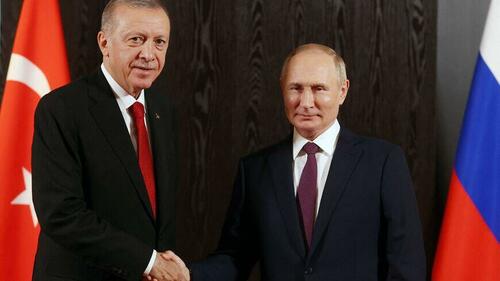
Turkish President Recep Tayyip Erdogan announced Friday following a phone call with his Russian counterpart Vladimir Putin that Russia has agreed to extend the Black Sea grain deal, set to expire next week.
"We are preparing to welcome Putin in August and we agree on the extension of the Black Sea grain corridor," Erdogan told a press briefing, following what he described as negotiations centered on easing the global food crisis.
The deal is set to expire Monday, which has been a major concern given Putin's repeat threats to not renew it, citing that the Ukraine navy has been mining the Black Sea corridor and other severe violations of the UN-brokered deal. But Russia has yet to confirm the optimism regarding the deal's extension coming out of Turkey.

Crucially, Russian state media is sending mixed signals as no initial confirmation was given from the Kremlin within the hour of Erdogan's announcement. State-run TASS has, however, confirmed the upcoming Putin trip to Turkey:
"You know, we are preparing to receive Mr. Putin in August," he told reporters in Istanbul on Friday. "And we have common positions on this Black Sea grain initiative. UN Secretary General António Guterres sent a letter to Putin. I hope that with this letter and with our joint efforts with Russia, we will extend the agreement on the grain corridor," Erdogan said.
The broadcast was hosted by TV channel A Haber . "I hope that in this way and thanks to common positions with Putin, we will contribute to solving the problems of the least developed, poor African countries," Erdogan added.
The aforementioned UN letter is in reference UN Secretary-General Antonio Guterres this week appealing to Putin on the urgency of extending the deal, which expressed willingness to remove hurdles on Russian fertilizer exports.
Putin's Thursday comments still sent a bleak signal, as he complained that "not one" of Russia's conditions were met:
"I want to emphasize that nothing was done, nothing at all. It's all one-sided," Putin said in a televised interview, adding: "We will think about what to do, we have a few more days."
And at around the same time as Erdogan's Friday statement announcing extension, the following was published in Russia's Sputnik - which if true introduces yet further hurdles for the grain export initiative:
The command of Russia’s Black Sea Fleet has issued a marine navigation warning over a Ukrainian sea mine in the northwestern part of the Black Sea, the Russian Defense Ministry said on Friday.
"The command of the Black Sea Fleet has issued a warning to mariners about the presence of a mine hazard on the shipping route in the northwestern part of the Black Sea. The warning to mariners is due to the discovery of a Ukrainian sea mine, which drifted uncontrollably, endangering the safe navigation of civilian ships," the ministry said in a statement.
The Kremlin has meanwhile expressly denied that's it's announced any agreements regarding extension:
Russia has not made any statements on the extension of the Black Sea grain deal, the Interfax news agency reported on Friday, citing Kremlin spokesman Dmitry Peskov.
Earlier, Turkish President Recep Tayyip Erdogan said he was in agreement with Russia’s President Vladimir Putin that the deal, which allows the export of Ukrainian grain via the Black Sea, should be extended.
Amid a slew of Western reports following Erdogan's announcement, was something lost in translation?
Meanwhile, the geopolitical analysis blog Moon of Alabama explains that "The grain deal had two parts. One was the access of ships to Ukrainian harbors. The other was the normal export of grain and fertilizer from Russia." Further, "While Russia had facilitated the first part of the deal the 'West' had collectively blocked the second part."
"The lengthy creation of exclusive payment channels that can be blocked and controlled by the 'West', as Guterres now offers, is not a solution that Russia will support," the analysis continues. "When you see the next headline about 'Russia blocking Ukrainian exports to hungry people' keep the above in mind."
Turkish President Recep Tayyip Erdogan announced Friday following a phone call with his Russian counterpart Vladimir Putin that Russia has agreed to extend the Black Sea grain deal, set to expire next week.
“We are preparing to welcome Putin in August and we agree on the extension of the Black Sea grain corridor,” Erdogan told a press briefing, following what he described as negotiations centered on easing the global food crisis.
The deal is set to expire Monday, which has been a major concern given Putin’s repeat threats to not renew it, citing that the Ukraine navy has been mining the Black Sea corridor and other severe violations of the UN-brokered deal. But Russia has yet to confirm the optimism regarding the deal’s extension coming out of Turkey.

Crucially, Russian state media is sending mixed signals as no initial confirmation was given from the Kremlin within the hour of Erdogan’s announcement. State-run TASS has, however, confirmed the upcoming Putin trip to Turkey:
“You know, we are preparing to receive Mr. Putin in August,” he told reporters in Istanbul on Friday. “And we have common positions on this Black Sea grain initiative. UN Secretary General António Guterres sent a letter to Putin. I hope that with this letter and with our joint efforts with Russia, we will extend the agreement on the grain corridor,” Erdogan said.
The broadcast was hosted by TV channel A Haber . “I hope that in this way and thanks to common positions with Putin, we will contribute to solving the problems of the least developed, poor African countries,” Erdogan added.
The aforementioned UN letter is in reference UN Secretary-General Antonio Guterres this week appealing to Putin on the urgency of extending the deal, which expressed willingness to remove hurdles on Russian fertilizer exports.
Putin’s Thursday comments still sent a bleak signal, as he complained that “not one” of Russia’s conditions were met:
“I want to emphasize that nothing was done, nothing at all. It’s all one-sided,” Putin said in a televised interview, adding: “We will think about what to do, we have a few more days.”
And at around the same time as Erdogan’s Friday statement announcing extension, the following was published in Russia’s Sputnik – which if true introduces yet further hurdles for the grain export initiative:
The command of Russia’s Black Sea Fleet has issued a marine navigation warning over a Ukrainian sea mine in the northwestern part of the Black Sea, the Russian Defense Ministry said on Friday.
“The command of the Black Sea Fleet has issued a warning to mariners about the presence of a mine hazard on the shipping route in the northwestern part of the Black Sea. The warning to mariners is due to the discovery of a Ukrainian sea mine, which drifted uncontrollably, endangering the safe navigation of civilian ships,” the ministry said in a statement.
The Kremlin has meanwhile expressly denied that’s it’s announced any agreements regarding extension:
Russia has not made any statements on the extension of the Black Sea grain deal, the Interfax news agency reported on Friday, citing Kremlin spokesman Dmitry Peskov.
Earlier, Turkish President Recep Tayyip Erdogan said he was in agreement with Russia’s President Vladimir Putin that the deal, which allows the export of Ukrainian grain via the Black Sea, should be extended.
Amid a slew of Western reports following Erdogan’s announcement, was something lost in translation?
Meanwhile, the geopolitical analysis blog Moon of Alabama explains that “The grain deal had two parts. One was the access of ships to Ukrainian harbors. The other was the normal export of grain and fertilizer from Russia.” Further, “While Russia had facilitated the first part of the deal the ‘West’ had collectively blocked the second part.”
“The lengthy creation of exclusive payment channels that can be blocked and controlled by the ‘West’, as Guterres now offers, is not a solution that Russia will support,” the analysis continues. “When you see the next headline about ‘Russia blocking Ukrainian exports to hungry people’ keep the above in mind.”
Loading…





